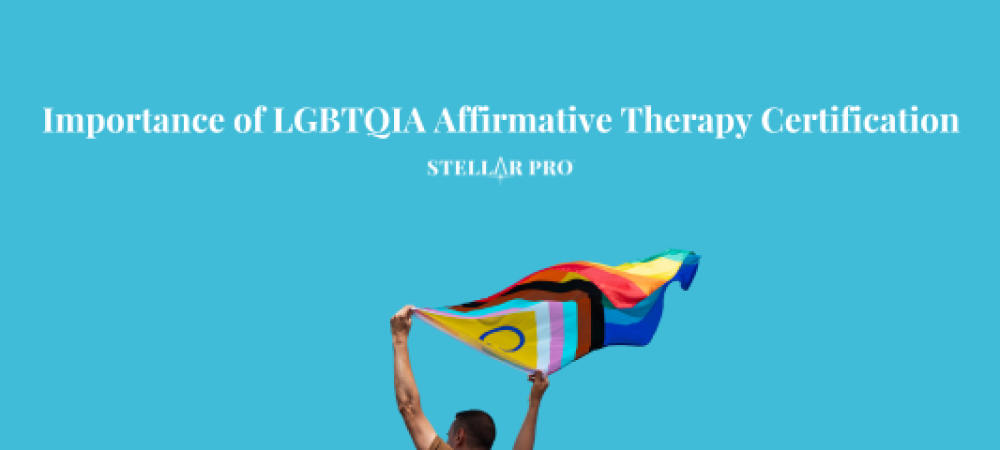Stellar Pro understands how frustrating it can be to find LGBTQIA-affirmative therapy. On other therapy directories, nearly every therapist has “LGBTQ+” checked on their profile. But when you call them and ask pointed questions about your therapy goals it’s clear they are unknowledgeable to LGBTQ+ psycho-social needs and discourse.
That’s why, at Stellar Pro we verify our clinicians’ advanced training and expertise. When you see a therapist with a LGBTQIA-affirmative therapy certification you can be confident that they understand LGBTQ+ psycho-social needs and discourse.
But what does LGBTQ-affirmative mean? Why should I find one that is certified? Keep reading below to learn more about LGBTA-affirmative therapy certifications and LGBTA-affirmative therapy.
What is a LGBTQIA Affirmative Therapy certification?
There are numerous institutions that offer accredited LGBTQIA affirmative therapy certifications. These include the Modern Sex Therapy Institute, American Association for Marriage and Family Therapy (AAMFTCA), and Affirmative Couch. Each of these organizations offers LGBTQ-affirmative training.
The goal of LGBTQ-affirmative training is to help therapists understand the needs of LGBTQIA+ clients on a deeper level. This includes “knowledge pertaining to minority stress, LGBT mental health, and unique clinical issues associated with working with sexual and gender minority individuals.” [https://psycnet.apa.org/fulltext/2018-11631-007.html] Clinicians should have also examined their attitudes and beliefs towards others and their own gender identity and sexual orientation.
Why is it important for your therapist to have LGBTQIA-Affirmative Therapy Certification?
Many therapists claim to be knowledgeable in LGBTQ+ issues. But upon further questioning clients find out that their therapist isn’t really that knowledgeable in the psycho-social needs and discourse of LGBTQ+.
A clinician who has received a LGBTQIA-affirmative therapy certification will have undergone a program focused on the therapy needs of LGBTQ+. They should also have the self-awareness and skills required to counsel LGBTQ+ clients, challenge oppressive stereotypes and systems, and be accepting of various lifestyles. Ideally, an LGBTQIA-affirmative therapist will seek out ongoing training to maintain up to date knowledge and skills when working with LGBTQ+ clients.
A LGBTQ-friendly therapist, one who has not received an LGBTQ-affirmative therapy certification, is not required to have any of this knowledge when working with LGBTQ+ clients. Even though they claim to be knowledgeable and accepting. You deserve a therapist who understands you and fosters an environment that encourages you to talk freely about your LGBTQIA+ experience.
How does Stellar Pro verify LGBTQ-Affirmative Therapy certifications?
Stellar Pro verifies clinicians’ advanced training and expertise. If you’re interested in joining Stellar Pro as a clinician you can learn more about our verification process here. Below is a bit about our verification process.
- Clinician submits transcripts/copies of certifications
- Stellar Pro verifies these credentials with their respective organizations. This can include phone calls & emailing.
- A badge is added to the clinicians profile
Stellar Pro is open to all mental health professionals, including counselors, therapists, and coaches.
Difference between LGBTQ-friendly and LGBTQ-affirmative
You may be wondering about the differences between LGBTQ-friendly and LGBTQ-affirmative therapists. Any therapist can self-identify as LGBTQ-friendly. On almost every therapy directory it is simply a box you check, regardless if you actually understand LGBT issues. LGBTQ-affirmative therapists are not only LGBTQ-friendly, but they have undergone additional training to understand the needs of LGBTQ clients. This includes discrimination, ridicule, and shame and the long-term internalized consequences of them.
Many LGBTQ-affirmative therapists are “either LGBTQ themselves or they have loved ones who are LGBTQ” as no advanced training can fully replicate the LGBTQIA+ experience. Of course, this does not mean that all LGBTQ-affirmative therapists identify as LGBTQIA+.
Additionally, LGBTQ-affirmative therapists “are neither externally nor internally homophobic, seeing no real difference between LGB people and straight people. They are similarly accepting of gender dysphoria and all sorts of other queer issues.”
Being an LGBT-affirmative therapist means they have:
– Undergone self-reflection on their “upbringing, attitudes and beliefs; acknowledge areas of privilege; recognize bias stemming from living in a heteronormative and gender-binaristic society”
– Gotten involved in promoting social justice and change while living an affirmative life
– Created an affirmative environment in their office
– Been open about their commitment to being a LBGTQ-affirmative therapist
– Educated cisgender/heterosexual clients about heterosexism and the gender binary
LGBTQ-affirmative therapists should inherently be LGBTQ-friendly. Why else would they have pursued further training in LGBTQ+? But LGBTQ-friendly does not inherently mean LGBTQ-affirmative. “ ‘The right therapist is out there for everyone, which makes it all the more reason to do your research, try therapy out, and keep looking until you find the right one.’ ” Stellar Pro makes it easy to research providers who are certified in LGBTQ-affirmative therapy. We verify our clinicians’ advanced training and expertise, so when you see the badge on their profile you know that they are uniquely qualified for your therapy needs.
What is LGBTQ-Affirmative Therapy?
LGBTQ-affirmative therapy is “an approach to therapy that embraces a positive view of Lesbian, Gay,Bisexual, Transgender, and Queer (LGBTQ) identities and relationships and addresses the negative influences that homophobia,transphobia, and heterosexism have on the lives of LGBTQ clients.” (NDSU)
“LGBT-affirmative therapists view same-sex attraction and gender diversity as normal variants of human gender and sexuality, and affirm LGBT individuals’ sexual orientation and gender identity.” LGBTQ-affirmative therapists should also:
– “Acknowledge the challenges of LGBTQIA+ clients
– Combat internalized homophobia or transphobia
– Not judge or pathologize non-traditional identities
– Provide support and resources to clients
– Help to resolve contradictory beliefs and needs”
Source: https://community.thriveglobal.com/what-is-affirmative-therapy/
What an LGBTQ-affirmative therapist will not try to do is “cure” you. Your LGBTQ-affirmative therapists office should be a safe and unconditionally accepting environment. During a session you should feel able to talk openly about any issues you are having.
Commons Reasons for LGBTQ-Affirmative Therapy
Every LGBTQIA+ individual has their own reasons for attending LGBTQ-affirmative therapy. These reasons can include:
– Difficulty discussing sexual topics with your partner(s)
– Issues around family abuse, neglect, and trauma
– Mixed sexual orientation relationships
– Confidence or shame issues
– Coming out process and concerns
– Identity questions
– Sexual development exploration questions
– Gender identity or gender care
– Self-harming behaviors
– “Sex Addiction” or Problem Sexual Behavior
– Anxiety and depression
– Body confidence, dysmorphia, image, and comparison issues
Even if you don’t see your reasons for wanting to attend LGBTQ+ affirmative therapy above, you still can benefit from therapy. This is where discussing therapy goals comes into play. Discussing your therapy goals with your LGBTQ-affirmative therapist will help you figure out if they are a good fit for you.
Worried that your therapist won’t be a good fit for you? Frustrated that you might have to start your search over? Part of being an LGBTQ-affirmative therapist is knowing when you need to refer a client to another therapist who is more suited for that client’s therapy needs. These recommendations, combined with the ease of finding an LGBTQ-affirmative therapist on Stellar Pro makes finding your ideal therapist easier than ever.
Do I need LGBTQ-Affirmative Therapy?
If you identify as LGBTQIA+ then yes! LGBTQ-affirmative therapy is for you. LGBTQ-affirmative therapists are uniquely suited to help with the therapy needs of LGBTQ+ individuals. Many LGBTQ+ individuals find talking to an LGBTQ-affirmative therapist to be much easier than non-affirmative therapists, as they feel more comfortable talking about their LGBTQ+ experience.
Benefits of LGBTQ-Affirmative Therapy
Many individuals find benefit in talking to an LGBTQ-affirmative therapist. Some benefits you may experience during therapy include:
– Improved body confidence and image
– Reduction in or elimination of self-harm behaviors
– Deeper understanding of your sexual orientation
– Deeper understanding of your gender identity
– Learning how to navigate discussions about sexual topics with your partner(s)
– Less anxiety and depression
– Personal growth
Everybody’s therapy journey is different. We’re so glad that you have chosen Stellar Pro to help you find a certified LGBTQ-affirmative therapist on your unique therapy journey. The above list is not exhaustive of all the benefits you can gain from LGBTQ-affirmative therapy. It’s important to discuss your therapy goals with your LGBTQ-affirmative therapist to come up with a plan to achieve them.
What can I expect from LGBTQ-Affirmative Therapy?
LGBTQ-affirmative therapy can be either online or in-person. LGBTQ-affirmative therapy works like other forms of talk therapy, except you can be confident that you are discussing your therapy needs with a clinician who understands LGBTQIA+ needs.
You and your therapist will work together to understand the issues you are facing. These can range from “How do I come out to my friends?” to “How do I figure out my gender identity?” to everything in between.
Your therapist may give you worksheets or specific task goals – such as journaling. They may also recommend books such as The Queens’ English: The Lgbtqia+ Dictionary of Lingo and Colloquial Phrases by Chloe O Davis. Be prepared to get asked tough questions and do a deeper reflection. Therapy can be difficult but it’s important to keep moving forward.
What will not happen is your therapist trying to “cure” you or dismissing your identity. LGBTQ-affirmative therapists understand that their clients may have had past negative experiences with therapists trying to do this. They will work with you to reassure you that your identity is valid and that they accept you unconditionally.
For those LGBTQIA+ clients who are attending sex therapy, what will not happen is nudity or any demonstrations of sexual acts.
Therapy may take a few sessions before you see a great improvement. Each client is different. Some clients only need 1-2 sessions while others need a more long term schedule. No matter how long therapy takes, remember that every session is helping you work towards your therapy goals.
Can couples benefit from LGBTQ-Affirmative Therapy?
Absolutely! Couples can find immense benefit from attending therapy with an LGBTQ-affirmative therapist.
How do I find a certified LGBTQ-Affirmative Therapist?
Stellar Pro makes it easier than ever to find a certified LGBTQ-affirmative therapist. We verify clinicians’ advanced training and expertise so when you are searching for a LGBTQ-affirming therapist, you can be sure that the ones you find on Stellar Pro are uniquely qualified for your therapy needs.
Once you have found a therapist that you feel will be a good match, we encourage you to contact their office for more information and to schedule an appointment.
GSRD vs LGBTQ+
Dr. Meg-John Barker, an expert in LGBTQ+ theory, sees that LGBTQ+ abbreviation is missing something. Instead, they proposed a new term for replacement: GSRD, or, Gender, Sexual, and Relationship Diversity. GSRD works to better serve the queer community as a whole. We will improve our relationships with gender and sexual ideology by reevaluating the fundamental knowledge.
It is easy to see that the words used to describe the relationship between “lesbian” or “gay” and explaining gender identity were constructed using old ideas. Only recently have we created terminology that addresses lived experiences for many individuals. Barker sees a problem with the original terms of “lesbian” and “gay” in that they rely on a person’s chosen gender identity in order to be applicable. “Lesbian”, for example, necessitates that a person identifies as a woman and is attracted to another woman-identified person. This definition ignores biology and uses terminology that has roots from old ideas, ignoring that people may experience different attractions based on sex organs even if that person does not assign themselves a gendered identity.
GSRD alleviates significant pressure from the Q+ in LGBTQ+. According to Barker, and our experiences, we feel we can do better in representing all people who are queer. However, Stellar Pro chose to use LGBTQ+ over GSRD because of its widespread understandability.
Why should I choose Stellar Pro to find a certified LGBTQ-Affirmative Therapist?
Stellar Pro is the only therapy directory that verifies and highlights clinicians’ advanced training and expertise. We make it easy to find a therapist that specializes in LGBTQ+ issues. When you find a therapist on Stellar Pro you are assured that you are matching with somebody who is trained in the psycho-social needs and discourse of LGBTQIA+ clients.




